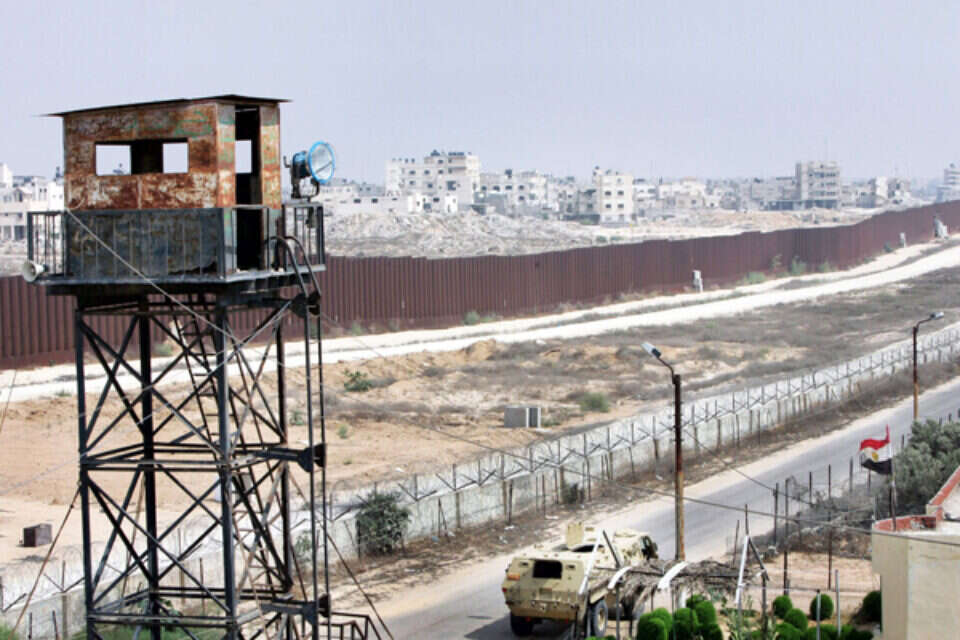Documentation of the entry of 36th Division forces on a mission in camps in the central Gaza Strip | IDF Spokesperson
Despite the emphatic statements by the prime minister, defense minister and others about the "elimination" and "destruction" of Hamas, there is one big card that Israel does not intend to take from Hamas now: the Philadelphi Route.
Although there is an enormous smuggling network beneath this route, which crosses the Gaza Strip, there is no intention to occupy the area. A full occupation of the critical area, as was carried out in the northern and central Gaza Strip, is not going to happen. The main reason for this is Egyptian opposition.
A "gift" to Hamas. Philadelphi axis (archive), photo: AP
The non-occupation of the route near Rafah is not an exaggeration to be defined as a double omission. Symbolically, this is a significant asset of Hamas that has not been deprived of it. Practically, through the tunnels beneath Philadelphi, Hamas' enormous arms were introduced. What Egypt knew about this may be revealed in the future. One person who certainly did not know the gravity of the smuggling situation before the war was Israeli intelligence.
Fighting in Gaza, Archive,
Therefore, there is every reason to think that anyone who misread the picture before the war is mistaken about it even now. In contrast to the arguments of the political and intelligence leadership, that "nothing has entered Philadelphi today, or at most very little," it must be assumed that smuggling continues these days as well.
Local news channels in Gaza reported this week that Egyptian intelligence chief Abbas Kamel spoke directly with Yahya Sinwar on a secure line that ran through a tunnel from Egyptian Rafah to Gaza Rafah. If the tunnel telephone line is working, you have to worry that other components of the tunnel are also working. After the Simchat Torah massacre, it is no longer possible to close our eyes.
Creative ways
Instead of total control over the axis, as was the case until the disengagement, the professional echelons are required to examine creative levels. Entrusting the issue to the Egyptians to this day has yielded what our fighters in the Gaza Strip have encountered since the beginning of the fighting: well-established military infrastructure and multiple weapons. It is true that the Egyptians are exposing the area on their side, and this should be the guarantee that tunnel traffic will be stopped. Still, we've heard these explanations before, and the end is known.
IDF forces neutralizing tunnels in Gaza, archive, photo: IDF Spokesperson
A diplomatic source told Israel Hayom: "If we are not there, the smuggling will return. The Philadelphi route requires special attention and we will get to that as well, because this is a point that could be a magnet for smuggling operations."
Phase 3 of the war
Meanwhile, Israel is preparing for the transition to phase three of the fighting in Gaza, according to the military plans presented to the War Cabinet at the outset. According to assessments, during January the IDF will switch to targeted raids, preventive measures and an operational method different from the massive operations it has operated in the Gaza Strip so far. Despite the erroneous reports, Israel does not intend to give up its objectives of the fighting, but rather to continue in accordance with the plans adopted by the cabinet.
Destroyed roads in Gaza, under which tunnels apparently passed (archive), photo: AP
The third part of the plan will come after the IDF acts to dismantle Hamas' main force in the Gaza Strip. The IDF will then be required to act in a focused manner against guerrilla operations that are still taking place on the ground. There will be areas in the southern Gaza Strip that will still be characterized by a massive IDF presence, but the intention is to reduce the forces and withdraw from some of the areas that have already been cleaned.
Israeli tanks in the Gaza Strip, archive, photo: AP
This phase will last about six months, and will be followed by the fourth and significant stage of redesigning the civilian space in the Gaza Strip. Those plans for the "day after" have not yet moved into the practical stages of the discussions, but there is overt and covert American pressure to integrate the Palestinian Authority into the same civilian regime.
As Israel Hayom first reported, there is an intention to involve officials who belong to the Palestinian Authority in practice – but it will not be a unified official PA government in Judea, Samaria and Gaza as the American administration wants.
Delay in arms deliveries?
Meanwhile, Strategic Affairs Minister Ron Dermer arrived in Washington to check whether there was a delay in sending US arms shipments to Israel.
Slowing down arms deliveries: deliberate procrastination or holidays. Armored jeeps from the USA,
In recent days, the defense establishment has given the impression that the pace of American response to Israeli requests for armaments has slowed, but Israel is unclear as to the reasons for the delay. One possibility is that these are technical delays. Another, more disturbing reason is that there is a political intention to slow down in order to influence Israeli policy.
Political sources emphasize that there is no certainty that the Americans are delaying arms deliveries. They noted that the delays may be due to the slowing end-of-year vacation in the United States, rather than a substantive dispute with the United States.
Wrong? We'll fix it! If you find a mistake in the article, please share with us

